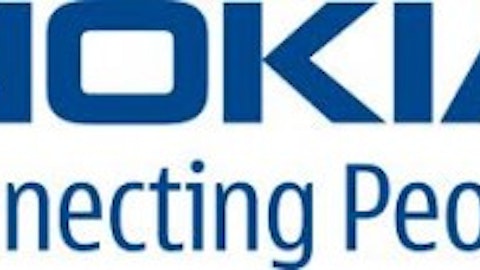In health care IT, the iPad is now an industry standard tool, with most medical reference and mobile EHR (electronic health record) apps being developed for Apple Inc. (NASDAQ:AAPL)‘s popular tablet. There are three primary reasons for this dedicated focus on Apple: its standardized system, its security, and its popularity.
Compared to the fragmented world of Google Inc (NASDAQ:GOOG) Android tablets, Apple Inc. (NASDAQ:AAPL)’s iPad offers the same experience across all units in the same generation due to its identical hardware and software configurations. This has made it much easier to develop, test, and market apps specifically designed for the iPad. The iPad is considered more secure than Android tablets, which persistently suffer from security flaws.
Lastly, the numbers speak for themselves — out of the 72% of physicians currently using tablets, over half of them prefer the iPad, according to a recent survey from Manhattan Research (sample size of almost 3,000 respondents).
Here comes an old challenger
With those facts and figures fueling the iPad’s growth, many people assume that Apple Inc. (NASDAQ:AAPL) is the undisputed king of mobile health care hardware. However, Apple’s nemesis Microsoft Corporation (NASDAQ:MSFT) hasn’t given up on penetrating the health care industry just yet.
During the HIMSS13 Annual Conference and Exhibition in March, Microsoft Corporation (NASDAQ:MSFT) unveiled Windows 8 software specifically designed for improving the mobility and productivity of medical practices. At the time, Microsoft’s Health and Life Sciences division stated that it had 850 health care apps in the Windows 8 Store.
Offering native support for EHR software
There are currently two types of mobile solutions available for physicians — “second screen” applications that offer limited functions from desktop-based EHR programs, and “native apps” built from the ground up to be independent from a desktop program and dependent on cloud-based solutions. Both second screen and native apps are usually developed first for Apple Inc. (NASDAQ:AAPL) iOS.
Microsoft Corporation (NASDAQ:MSFT), on the other hand, capitalizes on the fact that most desktop-based EHR programs are installed on Windows PCs at hospitals. Therefore, Windows 8 tablets allow clinicians to run EHR applications natively in a Windows environment, creating an identical experience to the one found on the desktop version. Windows 8 tablets also notably allow multiple windows to be open simultaneously — a feature that iPads and Android tablets lack.
Moreover, Windows 8 tablets have enhanced security features, such as BitLocker Drive Encryption, which is used to encrypt hard drives and USB flash drives. This is a critical feature, since 63% of hospitals experienced data breaches over the past two years.
Another notable feature is Windows To Go, which allows physicians to carry the entire operating system on a bootable flash drive. Therefore, the entire OS can be easily carried and executed on different computers, laptops, and tablets, and could be helpful in working with restrictive BYOD (bring your own device) restrictions at some hospitals.
Greenway still believes in Microsoft
Windows 8 tablets might never be as popular as iPads in hospitals, but it has at least one major backer — health care IT giant Greenway Medical Technologies, Inc. (NYSE:GWAY), best known for its PrimeSUITE EHR service.
In May, Greenway announced that it was developing a Windows 8 version of its mobile EHR program, PrimeMOBILE. PrimeMOBILE was recently ranked fifth in overall physician satisfaction by Black Book Rankings. Last June, Microsoft Corporation (NASDAQ:MSFT) integrated Greenway’s PrimeSUITE EHR into its HealthVault EHR platform, so a mobile solution can be considered an evolution of that technology.
Source: SK&A, A Cegedim Company, May 2013
Greenway has been losing to its rivals — its overall market share declined 9% between July 2012 and May 2013, and it is currently ranked 11th in overall EHR market share. However, Greenway’s support is critical for Microsoft Corporation (NASDAQ:MSFT)’s Windows 8 tablets to establish a firmer foothold in the health care IT market.
Can the health care industry save Windows 8 tablets?
During the second quarter of 2013, research firm IDC reported that there were 1.8 million Windows 8 tablets sold, establishing a 4% market share — a big jump from the 1% share it held in the previous year. However, that surge wasn’t fueled by sudden demand, but by big price cuts across the board.
Windows 8 tablets also face two major obstacles in winning widespread adoption in health care IT. The first is its fragmented hardware base. Like Android, there is a wide variety of Windows 8 tablets on the market. Different hospitals will invariably select different tablets based on pricing and features. This makes it difficult to create apps for a variety of hardware configurations.
Another problem is the same one that Windows Phone faces — is there really an incentive for developers to produce medical apps for Windows 8, when most physicians already favor the iPad?
The Foolish Bottom Line
Microsoft Corporation (NASDAQ:MSFT)’s intentions to push Windows 8 tablets into the health care industry will be a tough uphill battle. Even though Microsoft’s tablets have some useful features that can’t be found on iPads or Android tablets, they might not be enough to convince physicians and EHR companies to ditch their iPads.
However, just as Microsoft Corporation (NASDAQ:MSFT) was able to establish a growing niche share in smartphones with Nokia Corporation (ADR) (NYSE:NOK)‘s help, it might just manage to grab a small share of the lucrative North American health care IT market, which is forecast to grow at a CAGR (compound annual growth rate) of 7.4% to $31.3 billion by 2017.
The article Can Microsoft Convince Physicians To Ditch Their iPads? originally appeared on Fool.com and is written by Leo Sun.
Leo Sun owns shares of Apple. The Motley Fool recommends Apple. The Motley Fool owns shares of Apple and Microsoft.
Copyright © 1995 – 2013 The Motley Fool, LLC. All rights reserved. The Motley Fool has a disclosure policy.




